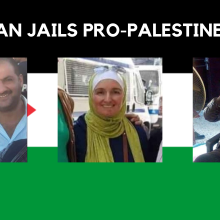February 10, 2022
In light of Egypt’s alarming record of severe human rights violations, often “justified” in the name of counterterrorism, the undersigned civil society organisations are appalled at the European Union’s determination to pursue chairing the Global Counterterrorism Forum (GCTF) with Egypt, and urge the EU to seriously reconsider and ultimately withdraw the bid.
United Nations Special Procedures warned in 2021 that in Egypt, “The continued misuse of counter-terrorism powers is not consistent with the State’s international law obligations and undermines broader international efforts to prevent terrorism by misusing such powers domestically.” Indeed, Egypt has seen an escalating, systematic crackdown on the rule of law and human rights, as well as the rise of specific targeting of human rights defenders (HRDs) through a sustained campaign of arbitrary arrests and detention, and politicised criminal proceedings against HRDs and opposition politicians for baseless “terrorism” charges. UN rights experts have denounced the Egyptian authorities’ arbitrary addition of HRDs to their “terrorists” list in 2020. Among these, Zyad El-Elaimy and Alaa Abdelfattah have also been sentenced to five years’ imprisonment, and Mohamed El-Baqer to four years in prison by emergency state security courts whose verdicts cannot be appealed, following patently unfair trials without due process. The UN experts have stressed – as have many of our organisations – that these cases, among many others, indicate “a systemic problem with human rights protections in Egypt, as well as a systemic problem in the abuse and misuse of counter-terrorism laws and practices.”
Egypt’s legal framework and practices have criminalised the lawful and legitimate exercise of fundamental rights and freedoms, notably freedoms of expression and association, and hindered the work of independent NGOs. UN experts confirm the Counterterrorism law’s provisions “go beyond the scope necessary to counter-terrorism and severely limit civic space and the exercise of fundamental freedoms in Egypt.” The Counterterrorism Law (no.94/2015) and the Terrorist Entities Law (no.8/2015) have harsh penalties and overly broad definitions, which have been broadened further by successive amendments. These amendments have also increased the negative impacts on individuals on the “terrorist list”. Meanwhile, Egypt has no remaining judicial or parliamentary counter-powers that are able or willing to hold the executive branch and security agencies accountable– which is all the more worrying in a country where torture, enforced disappearances and extrajudicial killings are rampant.
Beyond its dismal human rights track record, Egypt has also sought to weaken human rights protections at the multilateral level, consistently using its influence “to shift the emphasis of the UN’s global counterterrorism efforts away from human rights'' including at the UN Human Rights Council and the UN General Assembly. This undermines the fourth pillar of the UN’s own Global Counter-Terrorism Strategy, repeatedly reaffirmed by the General Assembly since 2006, which makes human rights and the rule of law the fundamental basis of all counterterrorism efforts and recognises civil society engagement as key to the legitimacy and effectiveness of counterterrorism efforts. Egypt has also attempted to distort and dilute the scope of the mandate of UN experts, including the UN Special Rapporteur on the promotion and protection of human rights while countering terrorism. All this therefore begs the question of how giving the Egyptian authorities a leading role in shaping global counter-terrorism policies, would support the EU in its commitment to promote human rights and the rule of law as core principles in such efforts.
The EU is well aware of the seriousness of the human rights crisis in Egypt, as is evident from several European states signing a cross-regional joint statement on Egypt in March 2021, as well as the repeated inclusion of Egypt in the EU’s item 4 statements at the UN HRC. After 32 states, including many European states, jointly condemned the human rights situation in Egypt, including the use of counter terrorism laws to punish peaceful critics, at the UNHRC, it is crucial to follow through and not to undermine this position by partnering with Egypt to chair the GCTF. Continuing the joint bid would run counter to the EU’s stated objective to promote human rights in foreign policy and would only contribute to Egypt’s longstanding efforts to whitewash its abhorrent human rights record, as it is hard to conceive how Egypt could possibly contribute to sharing any best practices in counterterrorism or to positively contribute to the GCTF’s stated goal of supporting the implementation of the UN Global Counter-Terrorism Strategy.
We therefore urge the EU to withdraw this bid and rather, to oppose any attempt by Egypt to lead the GCTF, as well as to increase efforts at the bilateral and multilateral levels to denounce and meaningfully address Egypt’s abuses, as also requested by the European Parliament in its latest urgency resolution on Egypt.
Signatories:
Cairo Institute for Human Rights Studies (CIHRS); Rights and Security International (RSI); Amnesty International; MENA Rights Group; Unidosc, Mexico; Human Rights Watch; World Organisation Against Torture (OMCT); Committee for Justice (CFJ); EuroMed Rights; International Federation for Human Rights (FIDH); Kenya Human Rights Commission; Charity & Security Network; Saferworld; Initiatives for International Dialogue (IID); The Tahrir Institute for Middle East Policy (TIMEP); DIGNITY - Danish Institute Against Torture.









